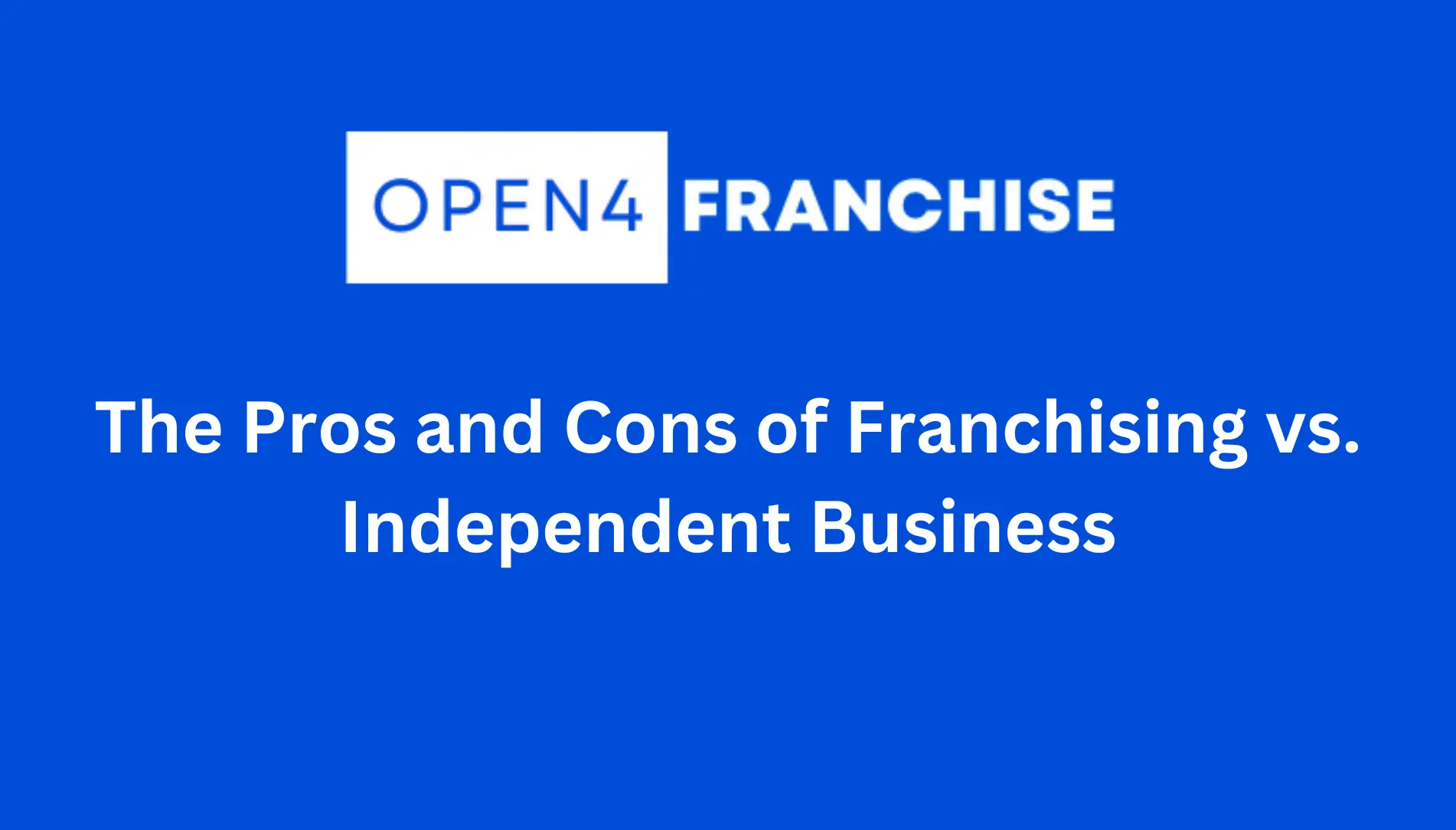The Pros and Cons of Franchising vs. Independent Business
By Admin | 2024-12-15 03:58:38

Starting your own business is a thrilling journey, but deciding on the type of business model is one of the first—and most critical—decisions you’ll make. Should you invest in a franchise or start an independent business from scratch? Both options come with their own set of pros and cons, and understanding them can make a world of difference in your entrepreneurial success. Let’s explore the key differences to help you decide what’s best for you.
What Is a Franchise?
A franchise is a business model where you purchase the right to operate under an established brand. You’ll follow their guidelines and use their systems while paying fees for the support and brand recognition.
What Is an Independent Business?
Starting an independent business means you’re building everything from scratch—branding, operations, marketing, and products. It’s entirely your own creation, giving you full control and responsibility.
The Pros of Franchising
1. Established Brand Recognition
With a franchise, you’re stepping into a business with an existing customer base and reputation. Customers already know and trust the brand, giving you a significant advantage over starting fresh.
2. Proven Business Model
Franchises come with tried-and-tested systems for operations, marketing, and management. This reduces the guesswork and increases the likelihood of success.
3. Training and Support
Franchisors provide initial training and ongoing support, including marketing materials, operational manuals, and troubleshooting assistance.
4. Easier Financing
Banks and financial institutions often view franchises as less risky than startups, making it easier to secure loans.
5. Marketing Assistance
Many franchisors handle national and regional marketing, meaning you won’t have to worry about large-scale campaigns.
The Cons of Franchising
1. Initial and Ongoing Fees
Franchise fees, royalty payments, and marketing contributions can add up, eating into your profits.
2. Limited Creativity
You must adhere to the franchisor’s rules and guidelines, leaving little room for personal innovation or brand adjustments.
3. Dependency on the Franchisor
If the franchisor’s reputation takes a hit or they change the terms of the agreement, your business could be negatively impacted.
4. Restricted Independence
Franchising is about following a system. If you’re someone who values full control, this might feel limiting.
The Pros of Independent Business
1. Full Creative Control
When you own an independent business, every decision is yours. From branding to menu design or product lineups, you call the shots.
2. No Ongoing Fees
You won’t have to pay royalties or marketing fees, meaning more of the profits stay in your pocket.
3. Flexibility in Operations
You can adapt your business quickly to market trends or customer demands without needing approval from a franchisor.
4. Unlimited Growth Potential
An independent business gives you the freedom to expand in any direction, whether it’s diversifying products or opening multiple locations.
The Cons of Independent Business
1. Higher Risk
Starting from scratch means there’s no proven formula to follow, making independent businesses riskier.
2. Longer Time to Establish
Building brand recognition and a customer base takes time and effort, unlike a franchise where these are already established.
3. Lack of Support
You’re on your own when it comes to training, marketing, and operations. This can be overwhelming for first-time entrepreneurs.
4. Difficulty Securing Financing
Banks often view independent startups as riskier investments, making it harder to get loans.
Key Considerations When Choosing
1. Your Personality and Goals
- Are you someone who thrives under structure and proven systems? Franchising might be the better fit.
- If you’re a creative risk-taker, an independent business may align better with your aspirations.
2. Budget
Franchising requires upfront fees and ongoing payments, while independent businesses demand substantial investment in setup and marketing. Assess which model fits your financial situation.
3. Industry Knowledge
If you’re new to an industry, a franchise provides guidance. If you’re an expert, going independent allows you to leverage your expertise.
4. Long-Term Vision
Consider your endgame: Are you looking to scale rapidly or create a unique, local business that’s entirely your own?
Franchising vs. Independent Business: Which Is Better?
There’s no one-size-fits-all answer. Franchising offers a head start with brand recognition and support but comes with fees and less autonomy. Independent businesses give you full control but demand creativity, effort, and resilience.
Your choice should align with your personality, financial situation, and business goals. Both paths have led countless entrepreneurs to success—it’s all about finding the right fit for you.
Conclusion
Whether you choose a franchise or an independent business, the journey will be filled with challenges and rewards. Understanding the pros and cons of each model will empower you to make a decision that aligns with your vision and capabilities. Whatever you decide, the key to success lies in hard work, dedication, and a willingness to learn.
FAQs
1. Are franchises easier to run than independent businesses?
Franchises come with support and a proven model, making them easier in some respects, but they still require effort and commitment.
2. Can I negotiate franchise fees?
In some cases, yes, especially with newer franchisors or for multi-unit agreements.
3. What industries are best for franchising?
Industries like fast food, fitness, and education are popular for franchising due to their scalability and demand.
4. Is an independent business riskier?
Yes, independent businesses often carry more risk since there’s no established brand or system to rely on.
5. Can I transition from an independent business to franchising?
Absolutely! Many successful businesses eventually franchise their model to expand.
About the Author
Hi, I'm the founder of Open4Franchise. I share business ideas, franchise opportunities, and tips to help entrepreneurs get started in the franchise world.